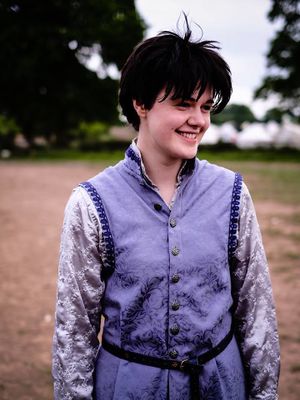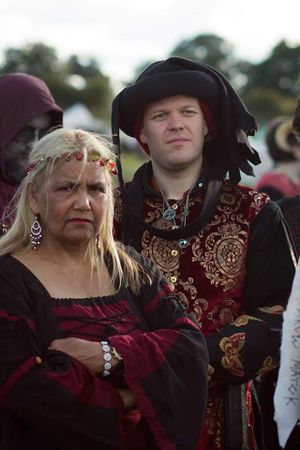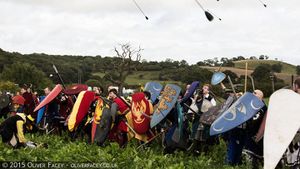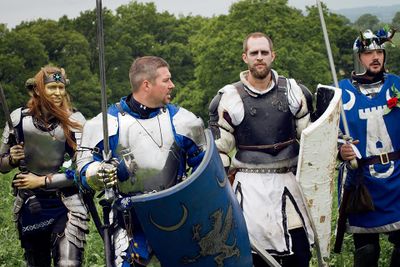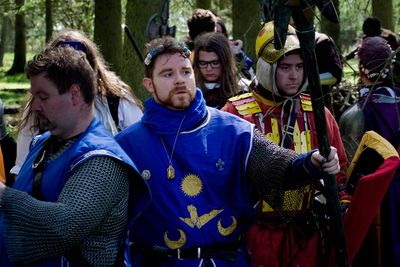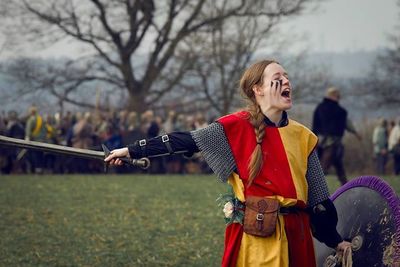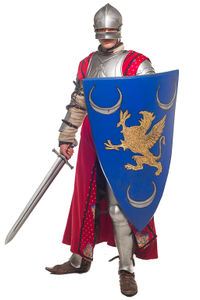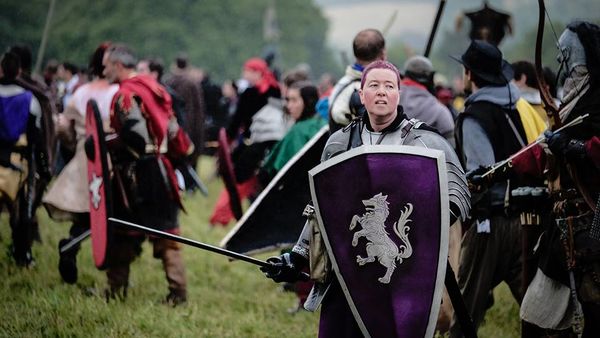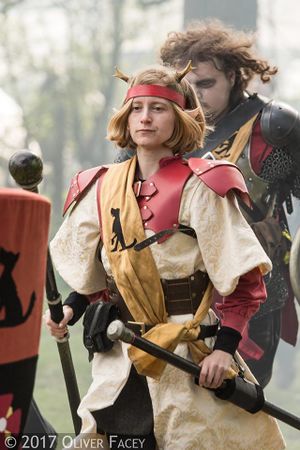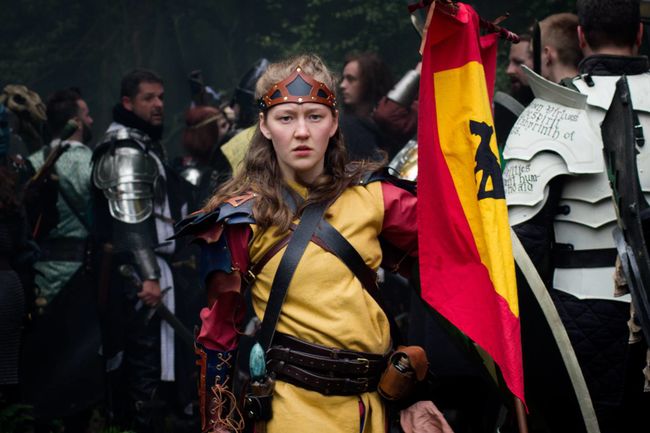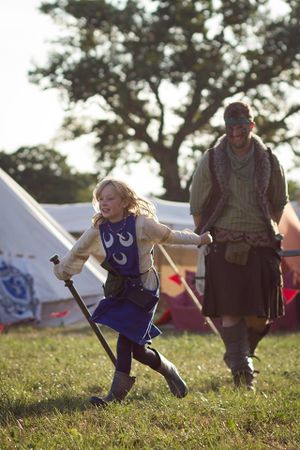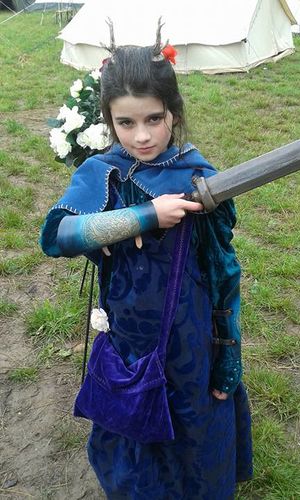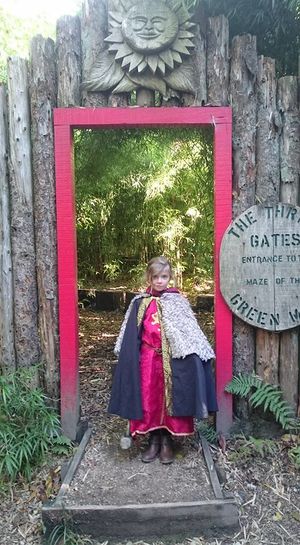Look and feel new dawn
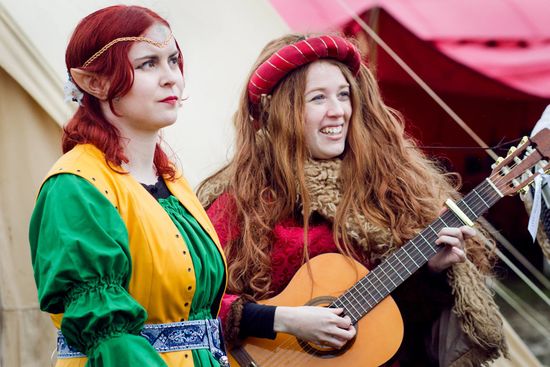
Overview
Arthurian, competitive, gleaming, glorious, romantic, Shakespearean, tragic, triumphant.
Dawn is the land of valour; the classical images of gleaming plate, of brightly coloured banners and traditional heraldic devices provide the imagery for the nation. Dawn is sumptuous in glowing primary colours, and idealistic in design instead of practical. The People of Dawn strive for glory; in how the look as well as in what they do. There is a touch of tragic flaw to the people here though also, with elements of Shakespeare's tragedies and Tennyson's poems threaded through their lives, leaving shadow in contrast to the brightness
Dawnish clothing reflects this; brightly coloured and often extravagent. The basic items are tunics and close fitting trousers, although a cotehardie, shirt and tabard, or gown can replace the tunic. Waistlines tend to be low, and the overall look tends to emphasise long lines. Decoration is often in the form of appliqued, embroidered, or painted images, rich fabrics, and dagged edging.
Costume Fundamentals
Tunic and Trousers: The baselayers of Dawnish costume. Trousers are usually close fitting, and tunics can lie anywhere from hip length to knee length, and tend to be closely fitted to the waist, perhaps even laced. Shirts are also popular rather than tunics, and are commonly worn under gowns, tabards, and surcoats.
Robes: Dawnish robes tend to be close fitting on the body, perhaps with wider skirts, and either tight or wide sleeves. This shape can be adapted in many ways; a short version can make a warrior’s coat, or a few can be layered over each other.
Gowns: Gowns worn are similar to robes, close fitting from shoulders to hips, with wide, almost reaching circular, skirts. The lines tend to be long, and while a belt is often worn, many have no defined waistline.
Houpellende: An alternative on these looks is the Houpellende, a wide robe made with a massive amount of fabric and gathered with a belt.
Surcoat or Tabard: Surcoats or tabards carrying house or personal heraldry are common, and a good way of adding colour. When designed to be worn over a gown, a surcoat can be open down the sides to show off the tighter underlayer.
Hat, Hood, or Circlet: Dawnish hats tend to the fantasical and magnificent. Elaborate headdresses are common, and medieval headdresses are an excellent source of inspiration. Hoods are popular, and are often heavily decorated, with embroidery and dagging, or made of multiple colours. Many Nobles wear leather or metal circlets and crowns.
Outerwear: In cold weather, many Dawnish citizens will often add another gown or robe as an extra layer, or may don a fur mantle. They also use cloaks, with semicircular and circular cloaks being the most common shapes seen.
Jewellery: Jewellery of most kinds is popular in metals and stone. Chain belts can add a lot to an extravagent look, and circlets and crowns are very majestic and worn by many nobles. Jewellery tends to be lavish rather than refined.
Fabrics and Colour Palette
Dawnish clothing is usually colourful, drawing colours from a meadow in full bloom. Colours tend towards vivid and rich, and focus on strong, often primary, colours. Emerald green, royal blue, bright purples, and reds across the spectrum from crimson to burgundy are all popular. While black and white are used, it is usually in smaller amounts as contrasts.
Dawn is a nation where you can really go wild with your fabrics and indulge yourself. Rich wools, intensely coloured silks, fine linens and velvets, and brocades would all work well, although brightly coloured cotton and linen are also popular, particular in warmer weather. While some of these are expensive, if you shop carefully it is possible to find these fabrics, or good imitations, cheaper. Brocades in particular can often by found cheaply as synthetics or as old curtains in charity shops. If you have a heavy, synthetic, or expensive fabric on your top layer, it may be valuable to have an under-tunic or shirt in thin cotton or linen that keeps the upper layers clean and is more comfortable on the skin.
Nobles and Yeofolk
Noble costume aims to the resplendent. While the cut of all Dawnish clothes is simple, the fabrics are often luxurious, the colours rich, and hems can be lined with fur or ermine. Often costume utilises house colours or embroidered with the house’s device.
Yeofolk wear less resplendent costume than nobles, but many are wealthy and most still dream of joining the nobility. Richer yeofolk may look similar to nobles from an impoverished house. Plainer fabrics can be used and keeping them in bright colours with high contrasts will help to ensure a Dawnish look. The clothing of Yeofolk may tend to the more practical side of Dawnish clothes.
War
On the battlefield, the Dawnish are a pageant of shining armour, blazing heraldry and exquisite banners. With the practice of girding, a Dawnish look on the battlefield is often as extravagent as that in peacetime.
Armour
Metal plate, chain, and leather are all seen in Dawn, but whatever the style of armour worn, at war the Dawnish aim to be as beautifully turned out as in peacetime.
A set of plate can be combined with surcoats, colourful underlayers, or a cloak for Dawnish pageantry and a regal look. It can also be painted or etched to add colour and symbols associated with the noble or their house.
}
Chain is common, and valued for protection. It is often worn with a Surcoat or tabard, and can be combined with sections of plate.
More expensive leather armour is often designed to use the shapes of traditional metal plate, and can be brightly coloured and decorated. Plainer leather is also worn for protection, Like chain, coats of leather plates or plain cuirasses are often combined with a surcoat or tabard bearing appropriate heraldry or colours.
Weapons
Dawnish weapons are inspired by chivalric knights. The archetypical weapon is a Cruciform sword, and weapons tend to be decorated; axes, warhammers, and maces are also used.
Shields are popular, especially as a way to display heraldy. Heater shields are the most common, though any shape is seen on the arms of a dawnish warrior.
Religion
Dawnish priests are often troubadours; skilled musicians or storytellers, and may carry an instrument or books of songs and tales prominently on their person. While they might wear a stole, these are usually lavish; heavily embroidered or made of beautiful fabrics. These can be used to carry the favours given to the priest in question, and may even bear the priest's heraldry.
Magic
(Pictures of Magic happening. Maybe a ritual or two?) A Dawnish witch should be obvious to see; flowing robes and mysterious cloaks are both popular.
Ritual staffs in Dawn are a way to display your prowess. They are often highly decorative, playing on the heraldry of the witch themselves (if they are a noble) or perhaps using beasts associated with the realms they utilise.
Mage Armour
The armour of the war witch often echoes the forms and shapes of traditional plate, although in sections, and can be decorated with heraldic symbols.
Children
Young children are an opportunity for noble houses to display their wealth and power. Squires are dressed in robes decorated with the house symbols. Older children, noble or yeoman, want the most expensive clothes their parents can afford. Even when not ornamented, clothing is often strikingly coloured.
Camps
When travelling, a Dawnish household still attempts to maintain distinctiveness. Tents might be plain, but are often decorated in the house colours, with bunting and floral decoration being popular. Large banners bearing a house's or individual's heraldry can be prominently displayed, as can small painted shields and devices.
Similar Nations
The Marches also draw from North-Western European Medieval fashion in inspiration, but tend more towards the practical and plain. Dawnish clothing uses brighter colours, however, and is more likely to include decorative features such as dagged edges. The use of bold and rich jewellery can also be a useful distinction.
There is some overlap with Wintermark clothing, but as with the Marches, distinction is in the colour and fabric; Dawnish clothing is brighter and richer, and Winterfolk are rarely seen in brocades, silks, and velvets.
The high-waisted houppelende is somewhat similar to a Leagueish gown, but Dawnish clothing does not typically include the slashes and puffs that characterise the League.
Less Appropriate
- Corsets worn as outerwear- While a wide belt might be similar, a corseted sillhoute is likely to look too stiff and modern for Dawnish styles.
- Tudor gowns, hoop skirts and bustles- A dawnish sillhoute is more "natural" than the exaggurated undergarments of early modern fashion. These styles of costume will usually look too modern for the Empire setting.
Further Reading
Core Brief
Additional Information
